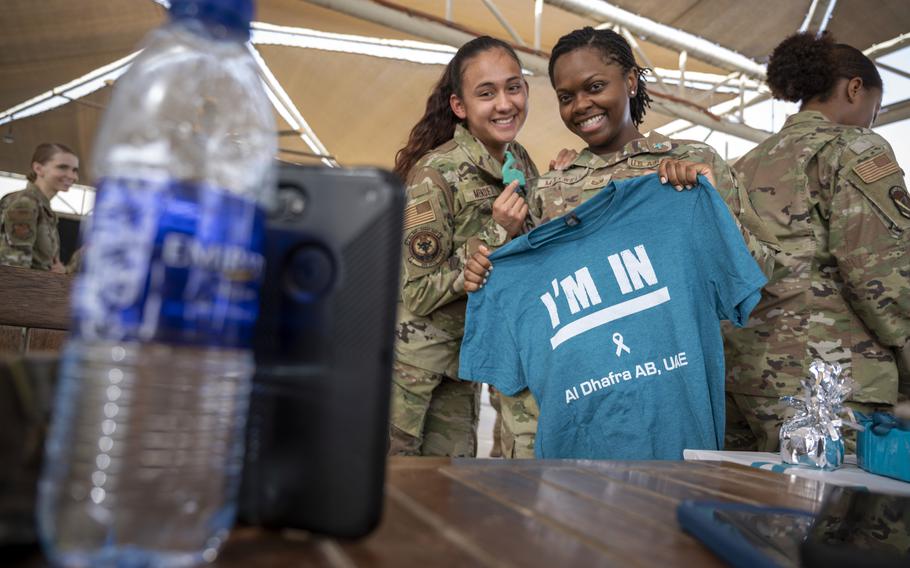
Airman 1st Class Mayra Mendez, and Tech. Sgt. Keonda Maxwell, 380th Expeditionary Force Support Squadron, pose together after a Teal Team 6 induction ceremony at Al Dhafra Air Base, United Arab Emirates, June 18, 2021. (Wolfram M. Stumpf/U.S. Air Force)
Dozens of soldiers and airmen have signed on to help snuff out hostile work environments under Al Dhafra Air Base’s “TEAL Team 6” initiative, part of a broader Pentagon push for cultural change.
The 380th Air Expeditionary Wing at the base in the United Arab Emirates recently swore in 29 volunteers, charging them with a “special mission” of improving unit culture by modeling good behavior and quashing inappropriate conduct, the wing said in a statement last month.
The team name is a play on both the similar sounding Navy special operations unit and the color of ribbons representing the military’s sexual assault prevention and response programs. And it's an acronym: TEAL stands for together, enhancing, advocating and leading, while the six represents values of courage, awareness, respect, empathy, responsibility and support.
The peer intervention program is one of several “grassroots” efforts launched within U.S. Air Forces Central, officials said, as the military continues to grapple with what Defense Secretary Lloyd Austin described last month as “the scourge of sexual assault and sexual harassment.”
An independent commission report on sexual assault in the military is slated to be published Friday. But Austin said in June he'd reviewed its findings, which call for changes to how the services prosecute sex crimes and related offenses, as well as the military’s prevention efforts, victim support services and culture.
TEAL Team 6 came about after AFCENT commander Lt. Gen. Greg Guillot told unit leaders earlier this year to develop at least five new initiatives to address sexual assault and harassment. The directive was inspired by the Air Force chief of staff’s charge to “accelerate change or lose,” spokesman Lt. Col. Phillip Ventura said.
Under another initiative, a pocket guide was created to aid supervisors and commanders in the deployed environment. Guillot also hosts monthly meetings to keep leaders focused on the issue.
“From day one, I charge commanders and senior civilian and enlisted leaders to demand a culture of dignity and respect,” Guillot said in an emailed statement.
Treating each other poorly degrades combat capability, Al Dhafra’s wing commander Brig. Gen. Andrew Clark told new TEAL Team 6 members at a June 18 induction ceremony. But traditional models of computer-based training and mandatory briefings weren’t cutting it because they don’t address the culture airmen create, he said.
Unlike the Navy’s elite SEALs, who tend to operate in literal and figurative darkness, TEAL Team 6 members are expected to bring the issues they’re battling into the light.
“Call people out … talk to supervisors,” Clark said. “You’re going to make this visible, and then you’re going to take care of those airmen that it affects.”
The volunteers have been trained to address inappropriate behavior and foster a healthier climate, Capt. Emma Wahlig, the wing’s sexual assault prevention and response coordinator, said in an email.
“We go through normal ways of addressing and policing inappropriate behaviors so as not to outcast the member,” she said.
They’re also familiarized with the base’s “helping agencies” that formally handle sexual assault and harassment, equal opportunity and mental and spiritual health, so they can help peers seek those services.
“We know it is sometimes hard for service members to just walk into a helping agency and ask for help,” said 1st Lt. Laura Schaefer in a January statement about a similar effort at Prince Sultan Air Base in Saudi Arabia.